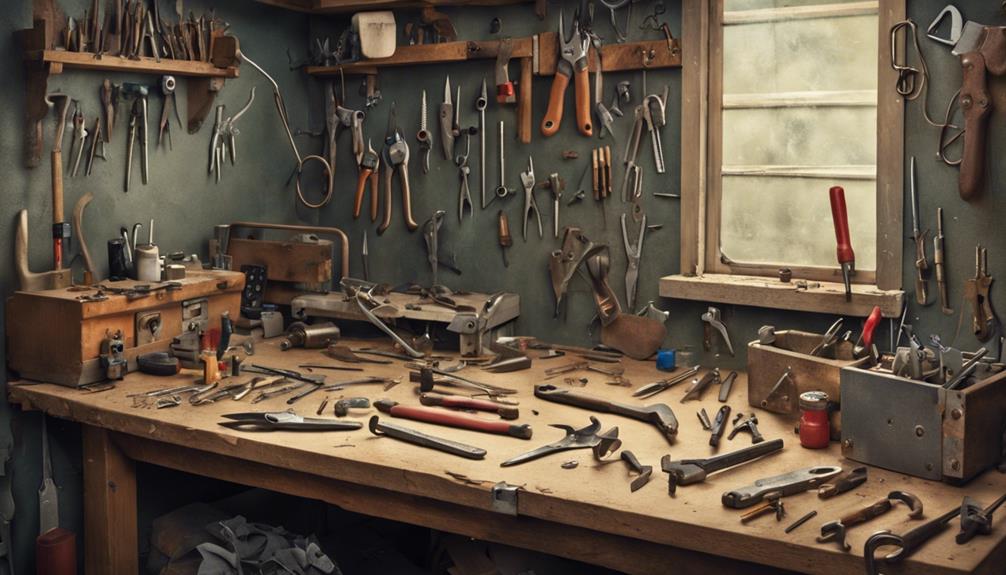Using the wrong tools for your lock replacement can lead to costly mistakes and damage. You risk stripping screws, misaligning holes, or even cracking your door frame when you use improper tools. This can result in functional issues, leaving your lock jammed or at risk of complete failure. Additionally, it can create safety hazards for you and others nearby. Not to mention, correcting these mistakes often means spending more on repairs or even a full lock replacement. By choosing the right tools, you can avoid these setbacks and guarantee a successful installation, and there's much more on this topic to reflect upon.
Key Takeaways
- Using improper tools can damage locks and doors, leading to costly repairs and complications during replacement.
- Wrong tools may misalign components, resulting in sticking or jamming locks that compromise functionality.
- Aesthetic damage, such as scratches and dents, occurs from the misuse of incompatible tools during installation.
- Tool-related injuries and safety hazards increase when using inadequate or makeshift tools for lock replacement.
- Investing in quality tools prevents mistakes, protects financial interests, and ensures successful lock replacements.
Importance of Proper Tools
When it comes to lock replacement, having the right tools is crucial for a successful outcome. You may not realize it, but the importance of proper tools can't be overstated. Using the best tools for lock replacement guarantees you're not only efficient but also safe.
Imagine helping a neighbor in need, only to find you're struggling because you don't have the right lock installation tools. It can be frustrating! Essential tools for tasks like lock re-keying can greatly ease the process.
Every lock is unique, and having the right tools allows for a seamless installation. You'll find that quality tools can make a notable difference in how quickly and effectively you serve others. Whether it's a simple screwdriver or a specialized key extractor, each tool plays a critical role in the process.
Moreover, using improper tools can damage both the lock and the door, leading to further complications. You want to provide a solution, not create more problems.
Common Lock Replacement Tools
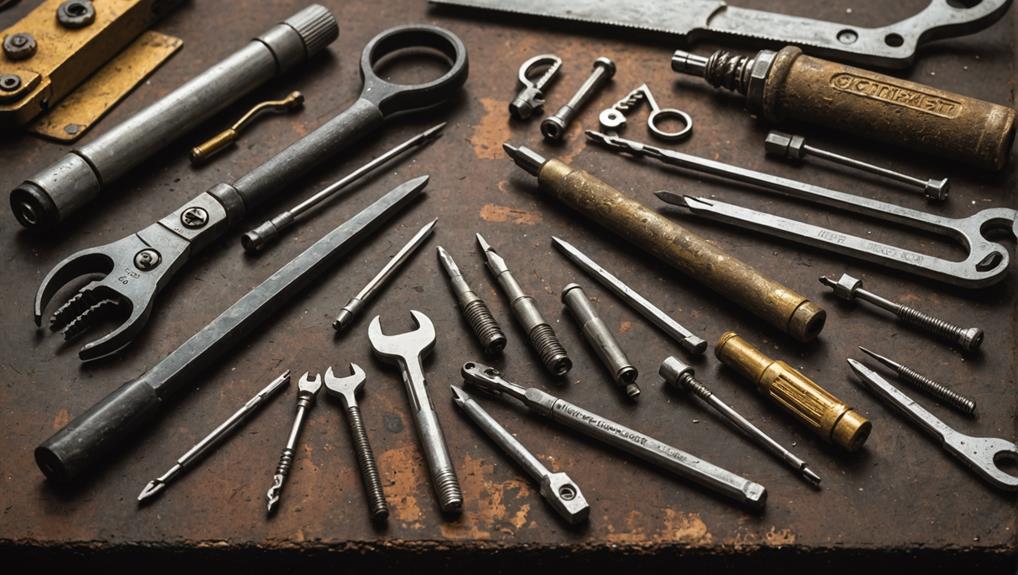
When you're replacing a lock, having the right tools is vital. Using improper tools can lead to damage or even make the situation worse.
For instance, using a screwdriver that's too large or too small can strip screws, making it difficult to remove the lock entirely.
Avoid common mistakes that can complicate your lock replacement process.
Let's explore the essential tools you need, the risks of using the wrong ones, and tips on selecting the best tools for your job.
Essential Tools Overview
Replacing locks requires having the right tools at your disposal to guarantee a smooth and efficient process. Using proper lock tools is essential to successfully complete any lock replacement without unnecessary hiccups. To get started, a lock tool guide can be invaluable, detailing the key items you'll need.
First, you'll want a screwdriver set, as screws often secure the lock in place. A pair of pliers can help with removing stubborn components. Additionally, a tension wrench is important for manipulating the lock cylinder when needed.
A drill may be necessary for removing old locks, especially if they're damaged.
Don't forget a measuring tape! Accurate measurements confirm you choose the correct size lock. A flashlight can also come in handy, particularly in dimly lit areas.
Improper Tool Consequences
Using the wrong tools during a lock replacement can lead to a host of problems that complicate the process. When you use improper tools, you not only increase your lock replacement risks but also potentially damage the lock itself or the door. This can create headaches for both you and the person you're serving, leaving them without a secure entryway for longer than necessary.
To help you understand the consequences of using the wrong tools, here's a quick reference:
| Wrong Tool | Consequence |
|---|---|
| Flathead screwdriver | Stripped screws |
| Pliers | Damaged lock components |
| Wrong size drill bit | Misaligned holes |
| Hammer | Cracked door frames |
| Improvised tools | Increased risk of injury |
Tool Selection Tips
Selecting the right tools for lock replacement is vital for a smooth and efficient process. First, you'll need a reliable screwdriver set. A flathead and Phillips screwdriver are essential for removing the screws that hold the lock in place.
Next, consider using a pair of pliers. They can help grip and pull stubborn components apart.
Don't forget a door knob or cylinder removal tool, specifically designed for this task. These tools make it easier to extract the lock without damaging the door.
A measuring tape is also handy to guarantee the new lock fits perfectly into the existing hole.
If you're working with deadbolts, having a chisel and a hammer can come in handy for adjustments.
Risks of Using Improper Tools
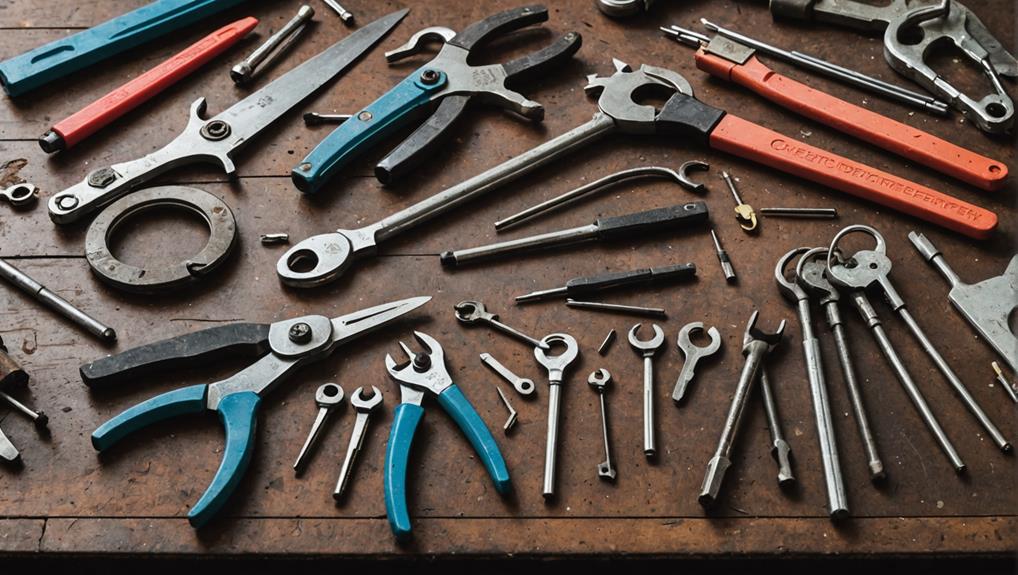
When tackling a lock replacement, the tools you choose can greatly impact the success of the job. Using improper tools puts you at risk of not only damaging the lock but also creating safety hazards for yourself and others.
For instance, if you opt for a screwdriver that's too small, you might slip and injure your hand or damage the surrounding area. This can lead to unnecessary stress and additional repairs. Additionally, selecting the right tools is vital for guaranteeing that you can effectively follow the steps outlined in mastering lock cylinder replacement.
Moreover, using the wrong wrench or pliers can strip screws or bolts, making it nearly impossible to secure the lock properly. This could leave a door vulnerable and compromise the safety of the space you're trying to protect.
If you're helping someone by replacing their lock, you want to make sure you're providing them with a reliable solution, not a temporary fix that could fail.
It's essential to recognize that the wrong tools can lead to frustration and a lack of confidence in your abilities. This can discourage you from helping others in the future.
Types of Damage From Wrong Tools
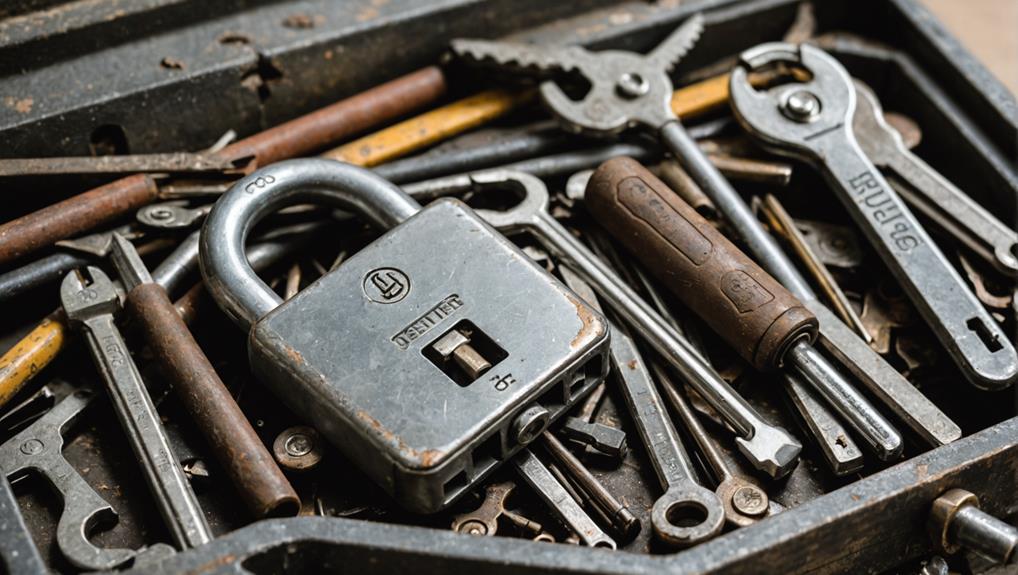
The impact of using the wrong tools can lead to several types of damage that not only affect the lock but also the surrounding areas. For instance, using a tool that isn't compatible with the lock can exacerbate issues like rust, which can greatly weaken the lock's mechanism and compromise its security.
the impact of rust on locks First, improper tools can strip screws or damage the lock's housing, making it difficult to reinstall or replace the lock properly. You might find yourself grappling with a lock that won't secure, leaving you and your clients vulnerable.
Next, using tools that aren't suited for the job can cause scratches or dents on the door or frame. This aesthetic damage can detract from the overall appearance of the property, creating dissatisfaction for you and your customers.
Additionally, if you force a tool that doesn't fit, you risk compromising the integrity of the door, potentially leading to more considerable repairs down the line.
Impact on Lock Functionality
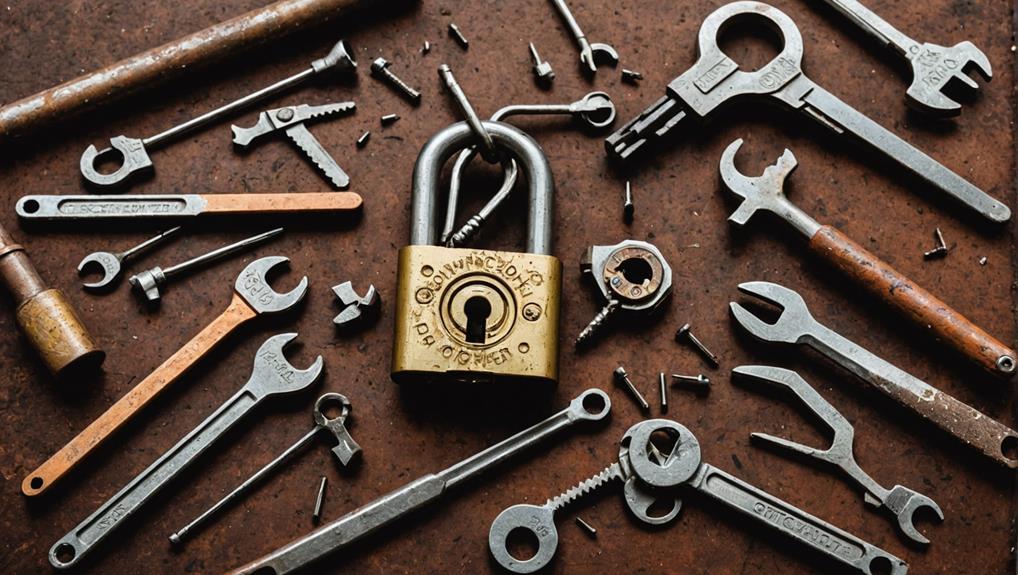
Using the right tools is essential for maintaining lock functionality. When you use improper tools, you risk damaging the internal mechanisms of the lock, leading to poor performance. For instance, using a screwdriver that's too large can strip screws or misalign components, which can be particularly problematic when working on complex designs like mastering keypad lock replacement. This misalignment can create sticking or jamming, making it difficult for others to rely on the lock.
Moreover, the wrong tools can cause unnecessary wear and tear. If you force a tool into a lock, you might create tiny fractures that compromise its integrity. Over time, these issues can lead to complete lock failure, leaving you and those you serve vulnerable.
You want to guarantee that every lock you replace operates smoothly, providing peace of mind to everyone who uses it. By investing in the right tools, you demonstrate your commitment to quality and reliability.
This attention to detail not only enhances the lock's lifespan but also guarantees that it functions as intended.
Safety Hazards Involved
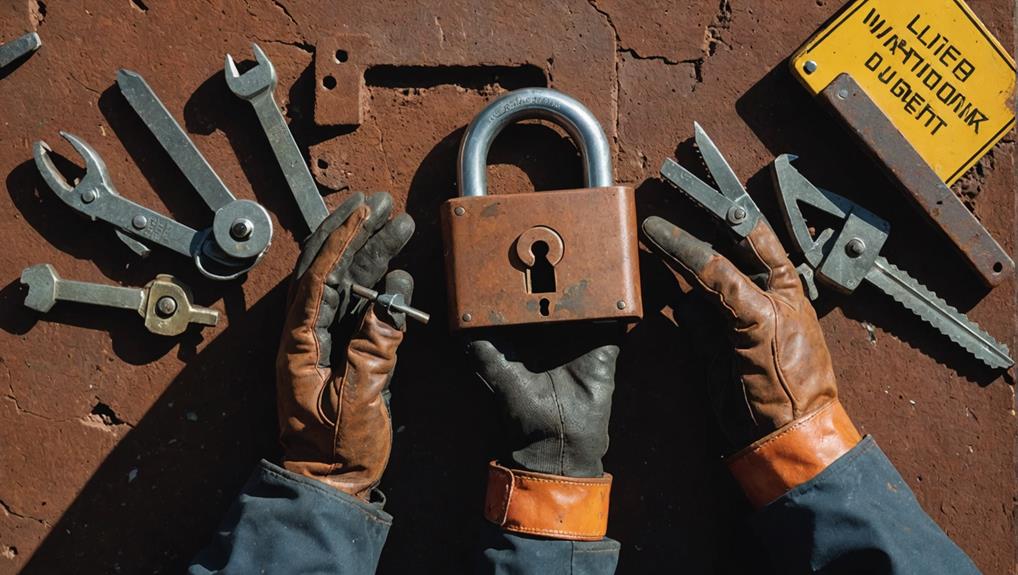
Improper tool use not only affects lock functionality but can also pose significant safety hazards. When you reach for the wrong tools, you risk injury to yourself and others.
For instance, using a screwdriver instead of a specialized lock pick can lead to slips and cuts, especially if you're applying excessive force. This not only jeopardizes your safety but can also create a chaotic environment for anyone nearby.
Additionally, opting for low-cost locksmith services often means using subpar tools, which can exacerbate these risks and lead to further complications, including the hidden dangers of cheap locksmith services.
Using tools that aren't designed for lock replacement can cause damage, resulting in sharp edges or broken parts. If someone brushes against these hazards, they could sustain serious injuries, which you certainly don't want happening on your watch.
You might also inadvertently compromise the integrity of the lock, leading to potential security issues for those you're serving. Imagine the anxiety of a family left vulnerable due to a faulty lock replacement; it's essential to prioritize safety for everyone involved.
To protect yourself and those around you, always choose the right tools for the job. This simple step not only enhances your efficiency but fosters a safer environment, allowing you to serve others with confidence and care.
Cost Implications of Mistakes
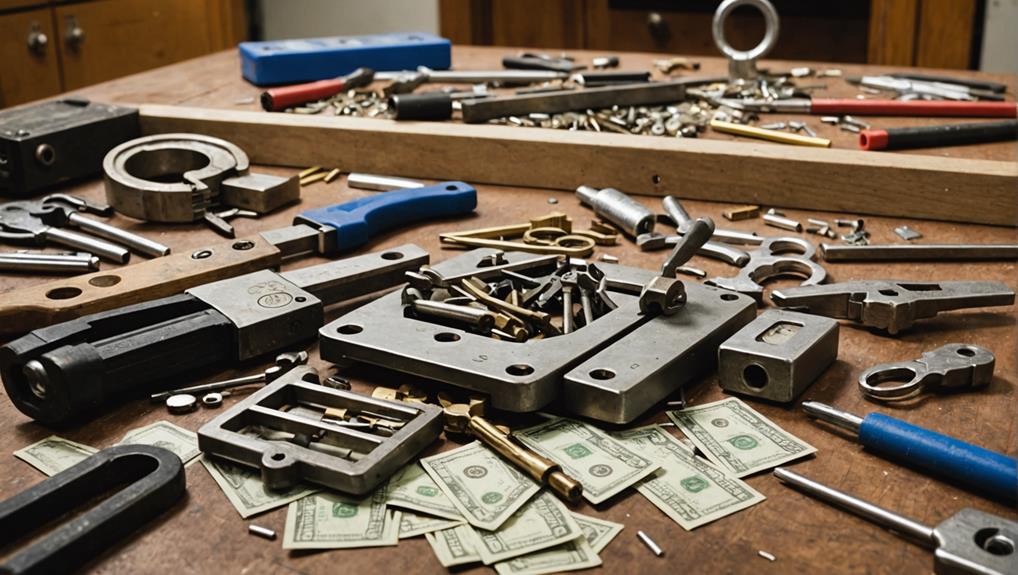
Even a single mistake during a lock replacement can lead to significant financial repercussions. You might think that cutting corners or using the wrong tools is a minor issue, but the costs can add up quickly.
Factors such as the type of lock and the material of the door can also influence the overall expenses involved in the replacement process, making it essential to approach the task with care. If you damage the lock or door, you'll not only face replacement costs, but also potential expenses for repairs.
Consider these possible financial impacts:
- Lock Replacement: A simple error could mean needing to buy a completely new lock, which is often more expensive than the one you initially chose. Understanding replacement costs can help you make a more informed decision.
- Door Repairs: If you cause damage to your door while trying to replace the lock, you'll likely need to hire a professional to fix it, which can be costly.
- Increased Security Risks: An improperly installed lock mightn't function correctly, leaving your home vulnerable and potentially leading to theft, which carries its own financial burden.
Ultimately, investing in the right tools and taking your time can save you money in the long run. By ensuring each step is done correctly, you're not just protecting your finances; you're also safeguarding your peace of mind and your loved ones.
Professional vs. DIY Approach
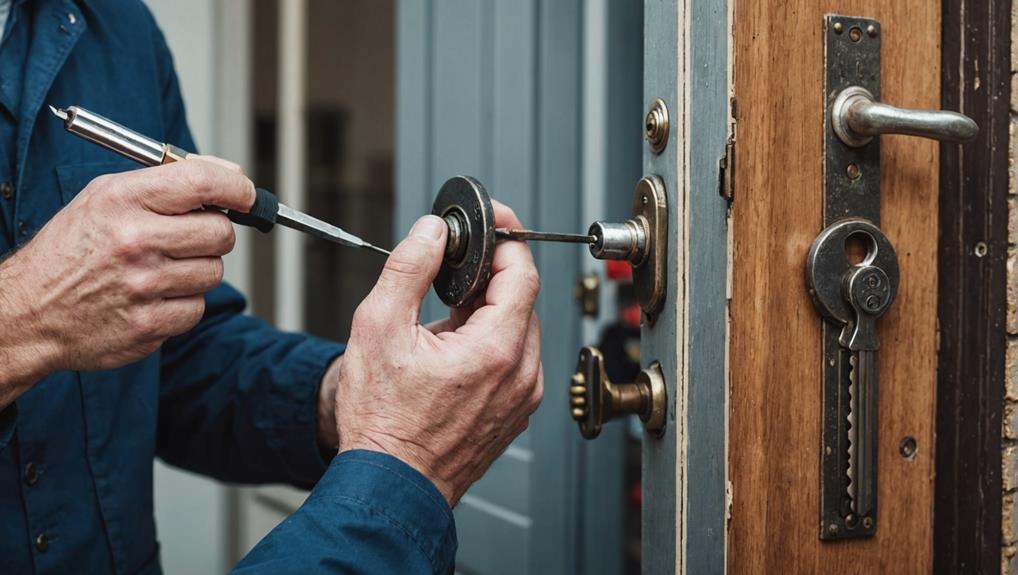
When it comes to lock replacement, choosing between a professional and a DIY approach can feel overwhelming. Both options come with their own benefits, and your decision often hinges on your skills, time, and budget.
If you're handy and enjoy tackling projects, a DIY approach might appeal to you. It offers a sense of accomplishment and can save you money, but it also requires you to have the right tools and knowledge to avoid costly mistakes. In fact, understanding the detailed cost comparison between DIY vs. Professional re-keying can further inform your decision-making process.
On the other hand, hiring a professional guarantees that the job gets done correctly and safely. Professionals have the experience and expertise to handle various lock types and situations. They can also offer valuable advice on maintaining your locks and enhancing your home's security.
If you're concerned about the intricacies of lock replacement or simply want peace of mind, going with a professional might be the best choice.
Ultimately, consider your priorities. Are you looking to serve others by enhancing their security? Or do you want to take on the challenge yourself?
Weighing these factors can help you make the right decision for your lock replacement needs.
Tips for Choosing the Right Tools
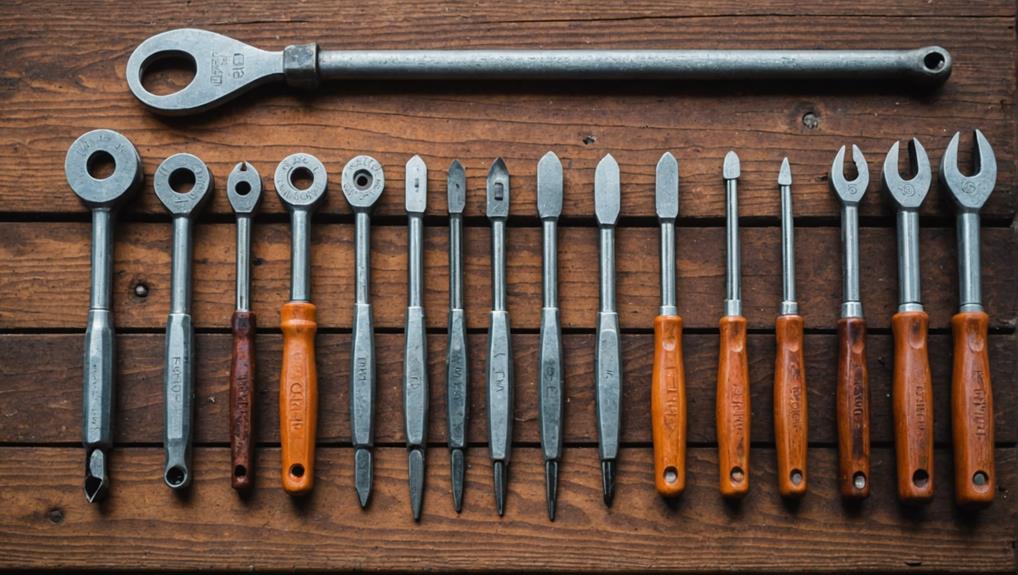
Selecting the right tools for lock replacement is vital to guaranteeing a smooth and successful project. When you're committed to serving others by enhancing their security, having the proper tools can make all the difference.
For instance, knowing how to navigate the intricacies of various lock types can greatly improve your efficiency and accuracy mastering deadbolt replacement. Here are some tips to help you choose wisely:
- Assess the Job: Understand the type of lock you're replacing. Different locks require specific tools, so knowing what you're up against is essential.
- Quality Over Quantity: Invest in high-quality tools that are built to last. This not only saves you time in the long run but also guarantees the safety and satisfaction of those you're helping.
- Read Reviews: Before purchasing, check online reviews or ask for recommendations. Hearing from others can give you insight into the effectiveness and reliability of the tools.
Frequently Asked Questions
How Can I Tell if My Tools Are Suitable for Lock Replacement?
To determine if your tools are suitable for lock replacement, check their specifications against the type of lock you're working on.
Make sure you have essential tools like a screwdriver, a tension wrench, and a pick set if needed.
Inspect the condition of your tools—worn or damaged tools can lead to problems.
If you've got the right tools and they're in good shape, you're ready to tackle the job effectively!
What Are the Signs That a Lock Has Been Damaged?
When a lock feels like a worn-out key in a forgotten drawer, it's time to pay attention.
Signs of damage include difficulty turning the key, visible rust or corrosion, and pieces that seem loose or misaligned.
If you notice any of these issues, it's essential to act promptly.
A damaged lock compromises security, so serving others by ensuring their safety starts with recognizing these warning signs in your own locks.
Can I Use Household Tools for Lock Replacement?
You might think household tools can handle lock replacement, but they often can't.
Using the wrong tools can lead to damage and frustration. Instead, it's best to use specialized tools designed for locks. They fit better and help guarantee a smooth process.
If you want the job done right, invest in or borrow the proper equipment. This way, you'll serve yourself and others by guaranteeing the lock works properly and securely.
How Do I Know When to Call a Professional?
You'll know it's time to call a professional when you encounter a lock issue that seems beyond your skills.
If you're facing stubborn bolts, complicated mechanisms, or if the lock's not functioning after your attempts, don't hesitate.
Also, if you lack the right tools or feel uncomfortable, it's smarter to seek help.
A professional can guarantee your lock's installed correctly, keeping everyone safe and secure without the hassle of DIY mistakes.
What Should I Do if I Damage My Lock During Replacement?
If you damage your lock during replacement, you're not alone—about 30% of DIYers encounter issues like this.
First, assess the extent of the damage; sometimes, a simple fix is all it needs. If it's beyond your skills, don't hesitate to call a professional.
They can restore your lock quickly and efficiently, ensuring your security isn't compromised.
Conclusion
Using the right tools is essential for a successful lock replacement. It guarantees functionality, prevents damage, and keeps you safe. By choosing the proper equipment, you save time, avoid costly mistakes, and enhance your skills. So whether you're a DIY enthusiast or considering a professional, remember: the right tools make all the difference. Invest in quality, prioritize safety, and enjoy peace of mind with every turn of the key. Your locks deserve the best, and so do you!

